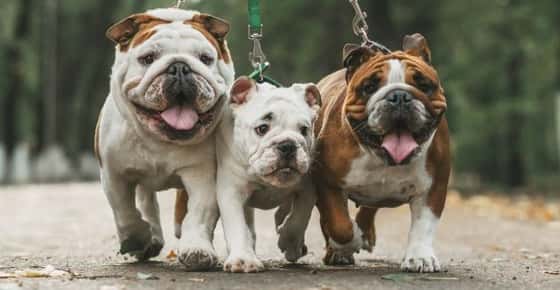
It is well known that each breed of dog tends to have certain health problems more common to that breed. This is probably due to genetics. As canine DNA is studied, it is hoped that we can eventually develop genetic tests for early detection and possible prevention of these diseases. In the meantime, when dog owners are considering adopting a certain breed of dog, they should consult a veterinarian to discuss what diseases are prevalent in that particular breed.
Trupanion, a pet health insurance company, did a survey of their claims over the last decade to determine the five most expensive dog breeds from a health care standpoint. They are, in order, the English Bulldog, the Bernese Mountain Dog, the Rottweiler, the Great Dane, and the French Bulldog.
The English Bulldog is prone to cherry eye, an enlargement of a gland on the third eyelid that appears as a red swelling in the inner corner of the eye; this responds to surgical correction. English Bulldogs also commonly get brachycephalic syndrome, a complex of several problems that includes a soft palate that is too long and makes it hard for the dog to breathe. They may even faint when they have this problem; this also makes it easier for them to suffer from heat stroke. Another part of this syndrome is stenotic nares, which means their nostrils are very narrowed. This contributes to the problem of breathing. All of these conditions can be helped by surgery. Bulldogs are also prone to the orthopedic problems of hip dysplasia, and patellar luxation. The hip problem leads to arthritis. Patellar luxation causes the kneecap to go in and out of place, and may lead to a rupture of the cruciate ligament inside the knee. Surgeries are available for these problems as well.
The Bernese Mountain Dog is prone to cataracts, and two kinds of cancer: mast cell tumors and histiocyctic sarcoma. Elbow dysplasia is a very common problem, this leads to arthritis of the elbow. Gastric torsion is more common in this breed. This where the stomach twists on itself, cutting off the blood supply to the stomach. Even with emergency surgery there is still a significant mortality rate.
The Rottweiler is predisposed to elbow dysplasia, gastric torsion, and hypothyroidism, a condition where the body does not make enough thyroid hormone. This is easily diagnosed with a blood test, and if low, the dog is given thyroid supplement medication for the rest of its life. Rottweilers are also prone to allergies. The symptoms most commonly show as itchy skin, but food allergies may also present as chronic vomiting and / or soft stools.
The Great Dane is inclined to get elbow and hip dysplasia, gastric torsion, and cardiomyopathy. This last disease is a severe condition of the heart muscle that has a poor prognosis. An ultrasound of the heart, called an echocardiogram, is required to diagnose this problem.
French Bulldogs are prone to allergies, brachycephalic syndrome, stenotic nares, and hip dysplasia.
Every dog breed has their own set of conditions to which they are predisposed. Unfortunately, no breed is perfectly healthy, but some are better than others! Your veterinarian can discuss each breed and any diseases.
